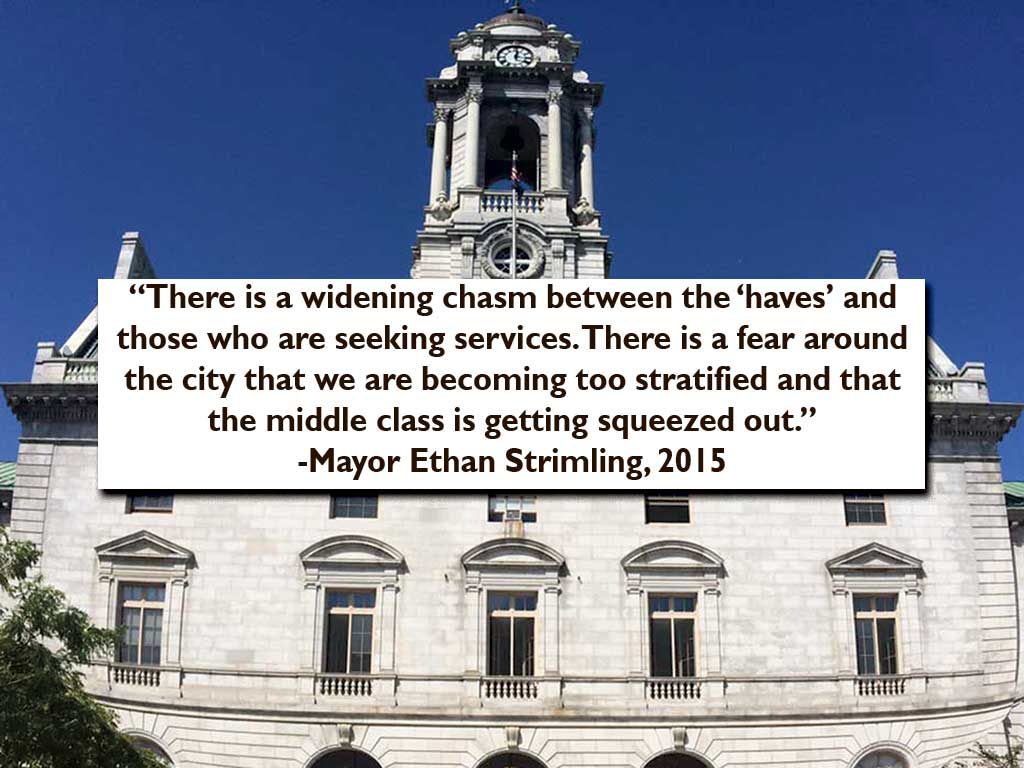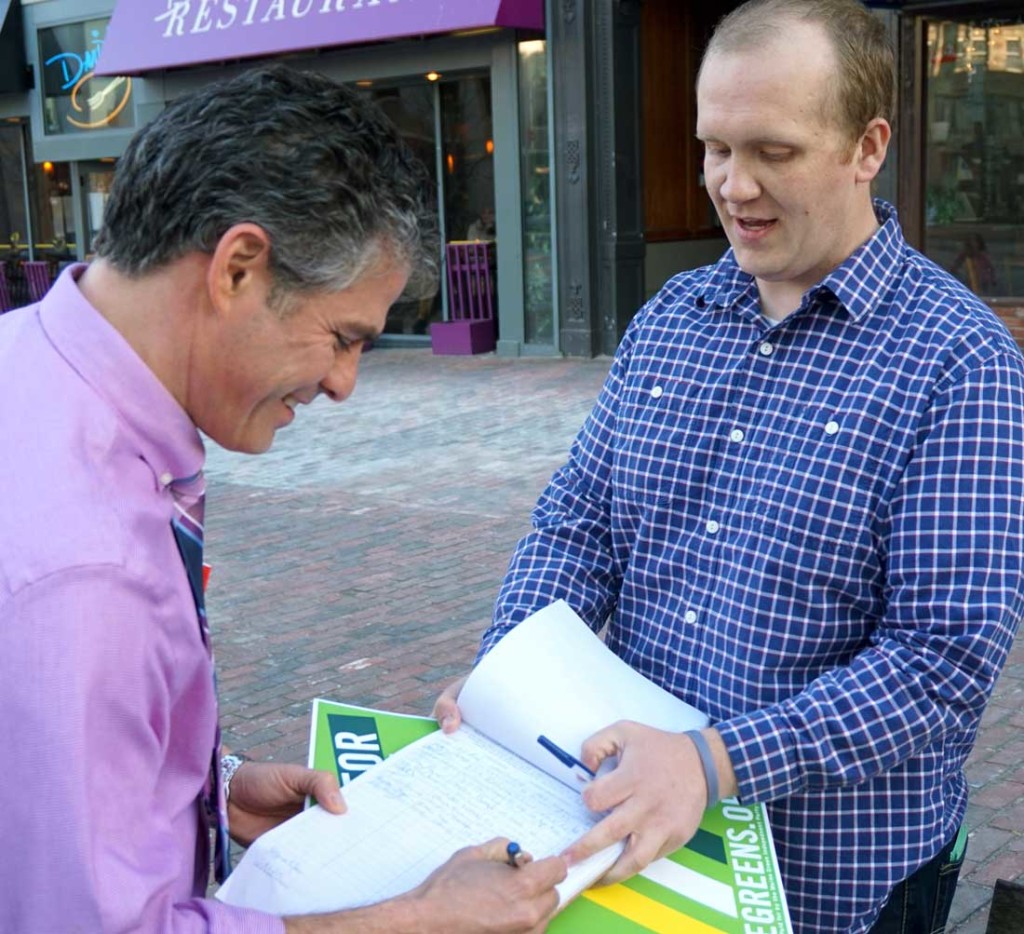THE STORY OF 2018
LEADERSHIP
by Tony Zeli

A BLUNT INSTRUMENT
There is a battle raging at the ballot box between the haves and the have-nots. Look at the issues addressed by referendum questions on the last five municipal ballots: housing, zoning, schools, wages, parks, drug policy… With a lack of leadership, neighbors have organized and offered their own solutions using a very challenging tool.
“The referendum is a blunt instrument,” activist Tom MacMillan told me in 2015. He was collecting signatures for the unsuccessful referendum for a $15 minimum wage.
After this year’s election, no matter how each of us votes, I think most would agree with his assessment. No, the referendum is not a replacement for leadership.

Ethan Strimling signs Tom MacMillan’s petition for a $15 minimum wage, Apr. 2015. -Photo by Tony Zeli
THE WIDENING CHASM
“There is a widening chasm between the ‘haves’ and those who are seeking services. There is a fear around the city that we are becoming too stratified and that the middle class is getting squeezed out,” Mayor Ethan Strimling told me during an interview shortly after his election in 2015.
The widening chasm he referred to could very well be the story of 2018. But I don’t think it has to be. And the difference will be leadership.
In 2015, the Mayor said his top goal was to create more housing. He had lofty targets during his campaign, proposing 2,000 new units in five years.
HERE’S ONE IDEA: MORE HOUSING
More housing certainly would both directly and indirectly alleviate many of the problems the city faces. At least, if we are talking about a diversity of housing. The city needs a mix of low-income, subsidized, workforce and market rate housing.
This is not a new or bold idea. In fact, the Greater Portland Council of Governments agrees. They produced the “2030 Workforce Housing Demand” report for the City of Portland in 2015. It concluded with the statement:
By increasing the diversity of housing through incentive and regulation, the region can forestall the possibility of another [housing] crash due to soaring prices unsustained by real job growth. Trend or choice? It is up to us.
We might not all agree, but we do know of solutions. Some even talk about them. We even have a mayor who has specifically identified one course of action: 2,000 new housing units. So then, what’s the problem?
FAILURE BY DESIGN
“My job is to turn that body of nine [city councilors] into a body of one. To build the relationships with each person so that they are feeling heard and their perspective is being incorporated, so that we can find answers that help move us forward,” Ethan Strimling said in 2015.
What went wrong? Unfortunately, the present-day position of the elected mayor was created to fail.
In 2008 voters approved of a Charter Commission. The commission included three appointed members and nine elected members. I attended almost every single meeting as the commission met for over a year. Many issues were debated, but replacing the council-manager form of government with a popularly elected mayor was top on the agenda.
Ultimately, half of the commission wanted to keep things the way they were. The commission was so evenly divided that their first vote, for who would chair the committee, was a 6-6 tie. The result of this divide was the creation of a little understood hybrid form of government.
Portland continues to be run by a city manager, a professional administrative position that is largely unaccountable to the public. And the popularly elected mayor is mostly a figurehead, a city councilor with a few extra powers and longer term of office.
TO STRENGTHEN OR TO ELIMINATE

by Ed King
The City must decide to either go forward and create an effective mayor position or retreat and possibly even eliminate the position all together. The issue will come to a head in the year to come. Mayor Strimling enters the second half of his term. He will be eager to build on accomplishments and prepare for campaign season.
Meanwhile, anti-mayor forces will rally. They will be driven to action, as the mayor uses what little powers he does have – control of the council agenda, committee appointments, budget veto power – and of course his greatest advantage, the bully pulpit, to push his agenda.
LEADERSHIP: LOOKING AHEAD
But, while this battle of wills plays out, it will be up to the rest of us to show true leadership. Roasnne Graef’s article, “Looking Ahead & Going Local,” highlights some of the activism the West End Neighborhood Association has been up to. It also recommends some ways to get involved.
Keep in mind during the challenges ahead that the story of 2018 is leadership. Let’s make it our story. It is up to us.
RESOURCES
Learn more about the housing situation in Portland, ME, with the HUD Comprehensive Housing Market Analysis: https://www.huduser.gov/portal/publications/pdf/PortlandME-comp-16.pdf
View the 2030 Workforce Housing Demand Report: https://www.portlandmaine.gov/DocumentCenter/View/7899
Learn more about the Charter Commission from thier Final Report in 2010: https://www.portlandmaine.gov/DocumentCenter/View/14761
Tony Zeli
Tony is publisher and editor of the West End News.






Leadership – The Story of 2018
THE STORY OF 2018
LEADERSHIP
by Tony Zeli
A BLUNT INSTRUMENT
There is a battle raging at the ballot box between the haves and the have-nots. Look at the issues addressed by referendum questions on the last five municipal ballots: housing, zoning, schools, wages, parks, drug policy… With a lack of leadership, neighbors have organized and offered their own solutions using a very challenging tool.
“The referendum is a blunt instrument,” activist Tom MacMillan told me in 2015. He was collecting signatures for the unsuccessful referendum for a $15 minimum wage.
After this year’s election, no matter how each of us votes, I think most would agree with his assessment. No, the referendum is not a replacement for leadership.
Ethan Strimling signs Tom MacMillan’s petition for a $15 minimum wage, Apr. 2015. -Photo by Tony Zeli
THE WIDENING CHASM
“There is a widening chasm between the ‘haves’ and those who are seeking services. There is a fear around the city that we are becoming too stratified and that the middle class is getting squeezed out,” Mayor Ethan Strimling told me during an interview shortly after his election in 2015.
The widening chasm he referred to could very well be the story of 2018. But I don’t think it has to be. And the difference will be leadership.
In 2015, the Mayor said his top goal was to create more housing. He had lofty targets during his campaign, proposing 2,000 new units in five years.
HERE’S ONE IDEA: MORE HOUSING
More housing certainly would both directly and indirectly alleviate many of the problems the city faces. At least, if we are talking about a diversity of housing. The city needs a mix of low-income, subsidized, workforce and market rate housing.
This is not a new or bold idea. In fact, the Greater Portland Council of Governments agrees. They produced the “2030 Workforce Housing Demand” report for the City of Portland in 2015. It concluded with the statement:
We might not all agree, but we do know of solutions. Some even talk about them. We even have a mayor who has specifically identified one course of action: 2,000 new housing units. So then, what’s the problem?
FAILURE BY DESIGN
“My job is to turn that body of nine [city councilors] into a body of one. To build the relationships with each person so that they are feeling heard and their perspective is being incorporated, so that we can find answers that help move us forward,” Ethan Strimling said in 2015.
What went wrong? Unfortunately, the present-day position of the elected mayor was created to fail.
In 2008 voters approved of a Charter Commission. The commission included three appointed members and nine elected members. I attended almost every single meeting as the commission met for over a year. Many issues were debated, but replacing the council-manager form of government with a popularly elected mayor was top on the agenda.
Ultimately, half of the commission wanted to keep things the way they were. The commission was so evenly divided that their first vote, for who would chair the committee, was a 6-6 tie. The result of this divide was the creation of a little understood hybrid form of government.
Portland continues to be run by a city manager, a professional administrative position that is largely unaccountable to the public. And the popularly elected mayor is mostly a figurehead, a city councilor with a few extra powers and longer term of office.
TO STRENGTHEN OR TO ELIMINATE
by Ed King
The City must decide to either go forward and create an effective mayor position or retreat and possibly even eliminate the position all together. The issue will come to a head in the year to come. Mayor Strimling enters the second half of his term. He will be eager to build on accomplishments and prepare for campaign season.
Meanwhile, anti-mayor forces will rally. They will be driven to action, as the mayor uses what little powers he does have – control of the council agenda, committee appointments, budget veto power – and of course his greatest advantage, the bully pulpit, to push his agenda.
LEADERSHIP: LOOKING AHEAD
But, while this battle of wills plays out, it will be up to the rest of us to show true leadership. Roasnne Graef’s article, “Looking Ahead & Going Local,” highlights some of the activism the West End Neighborhood Association has been up to. It also recommends some ways to get involved.
Keep in mind during the challenges ahead that the story of 2018 is leadership. Let’s make it our story. It is up to us.
RESOURCES
Learn more about the housing situation in Portland, ME, with the HUD Comprehensive Housing Market Analysis: https://www.huduser.gov/portal/publications/pdf/PortlandME-comp-16.pdf
View the 2030 Workforce Housing Demand Report: https://www.portlandmaine.gov/DocumentCenter/View/7899
Learn more about the Charter Commission from thier Final Report in 2010: https://www.portlandmaine.gov/DocumentCenter/View/14761
Tony Zeli
Tony is publisher and editor of the West End News.